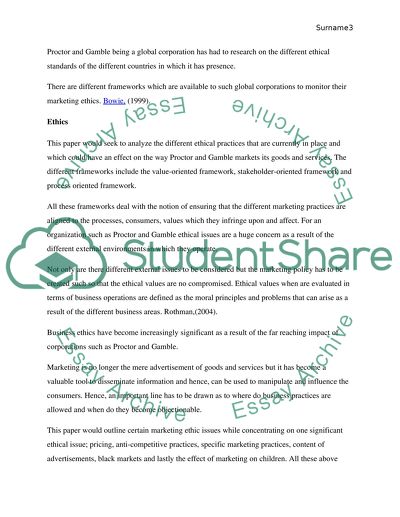Cite this document
(Marketing Ethics: Proctor and Gamble Case Study, n.d.)
Marketing Ethics: Proctor and Gamble Case Study. https://studentshare.org/marketing/1553290-using-a-global-corporationorganisation-discuss-the-impact-of-an-ethical-issue-on-the-business-process-of-marketing-its-products-and-services-you-are-expected-to-discuss-relevant-theory-and-the-potential-challenges-this-factor-will-make-on-the-organizat
Marketing Ethics: Proctor and Gamble Case Study. https://studentshare.org/marketing/1553290-using-a-global-corporationorganisation-discuss-the-impact-of-an-ethical-issue-on-the-business-process-of-marketing-its-products-and-services-you-are-expected-to-discuss-relevant-theory-and-the-potential-challenges-this-factor-will-make-on-the-organizat
(Marketing Ethics: Proctor and Gamble Case Study)
Marketing Ethics: Proctor and Gamble Case Study. https://studentshare.org/marketing/1553290-using-a-global-corporationorganisation-discuss-the-impact-of-an-ethical-issue-on-the-business-process-of-marketing-its-products-and-services-you-are-expected-to-discuss-relevant-theory-and-the-potential-challenges-this-factor-will-make-on-the-organizat.
Marketing Ethics: Proctor and Gamble Case Study. https://studentshare.org/marketing/1553290-using-a-global-corporationorganisation-discuss-the-impact-of-an-ethical-issue-on-the-business-process-of-marketing-its-products-and-services-you-are-expected-to-discuss-relevant-theory-and-the-potential-challenges-this-factor-will-make-on-the-organizat.
“Marketing Ethics: Proctor and Gamble Case Study”. https://studentshare.org/marketing/1553290-using-a-global-corporationorganisation-discuss-the-impact-of-an-ethical-issue-on-the-business-process-of-marketing-its-products-and-services-you-are-expected-to-discuss-relevant-theory-and-the-potential-challenges-this-factor-will-make-on-the-organizat.


